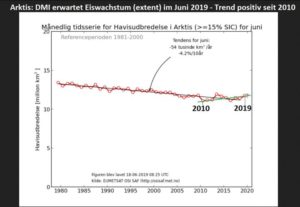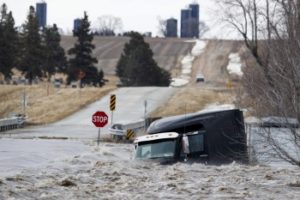by P. Gosselin, June 28, 2019 in NoTricksZone
The Danish Meteorological Institute (DMI) expects sea ice extent growth in June 2019:

The DMI plot for the development of Arctic sea ice area (extent) from June 1979 to the PROGNOSE for June, 2019. Since 2010, i.e. 9 years ago, the sea ice areas of the Arctic have been growing in trend. Reports about disappearing sea ice in the Arctic are fake news. See also: No ice melting in the Arctic in this decade. Source: DMI-Plots Ice Cover
May Arctic sea ice trend now stable 15 years
…
by Prof. Ernest Mund, 25 juin 2019 in ScienceClimatEnergie
A la façon dont vont les choses il paraît de plus en plus certain que la Belgique mettra la clé sous le paillasson de son parc de centrales nucléaires en 2025, conformément à la décision de la loi Deleuze votée en 2003. Cet abandon très néfaste est la conséquence du manque de discernement de la part des Autorités politiques au pouvoir face à l’hostilité irréductible du mouvement écologiste à l’égard du nucléaire.
Que cet abandon soit très néfaste est argumenté avec énormément de détails dans un rapport récent de l’IEA (Agence Internationale de l’Energie) dont plusieurs éléments chiffrés sont utilisés dans cette note [1]. Ce rapport analyse avec grande acuité le déclin du nucléaire en service, conçu au cours des années 70. A cette époque le système électrique était centralisé avec une intégration verticale de ses différentes composantes et le prix de l’électricité était le reflet des coûts, indépendamment de toute considération relative à une logique de marché. La taille des installations visait à la réduction des coûts par effet d’échelle. Ce nucléaire (de Génération-II et -III) est devenu totalement inadapté au système décentralisé actuel, alimenté pour une part rapidement croissante en sources d’énergie renouvelable intermittentes (EnRI, éolien et solaire) avec un prix de l’électricité relevant d’un marché, institué dans le courant des années 90.
…
by Chriss Street, June 28, 2019 in ClimateChangeDispatch
National Oceanic and Atmospheric Administration reported the month of May was the second wettest and temperatures were in the bottom-third for its 125-year US history.

The 2010 publication titled, ‘A Global Overview Of Drought and Heat-Induced Tree Mortality Reveals Emerging Climate Change Risks for Forests’, was accepted by the Obama administration as scientific evidence that climate change had made the Earth:
“…increasingly vulnerable to higher background tree mortality rates and die-off in response to future warming and drought, even in environments that are not normally considered water-limited.”
But NOAA just reported that May US precipitation totaled an average of 4.41 inches, 1.50 inches above average, and ranked second wettest in the 125-year period of record for May as well as second wettest for all months since January 1895.
The only wetter month in US history was May 2015 with 4.44 inches of precipitation.
The 37.68 inches of precipitation across the contiguous U.S. from June 2018 to May 2019 shattered the previous 1982-83 12-month period by 1.48 inches.
Near-record to record precipitation was observed from the West Coast through the central Plains and into the Great Lakes and parts of the Northeast.
As a result, severe May flooding was observed along the Arkansas, Missouri, and Mississippi rivers. Vicksburg, MS, reported ongoing flooding since mid-February.
…
by Judith Curry , June 28, 2019 in WUWT
Some reflections, stimulated by yesterday’s Congressional Hearing, on the different strategies of presenting Congressional testimony.
Yesterday’s Hearing provided an ‘interesting’ contrast in approaches to presenting testimony, when comparing my testimony with Michael Mann’s.
What are the purposes of expert testimony?
There is an interesting document entitled A Guide to Expert Testimony for Climate Scientists, funded by the US National Science Foundation. Most of this is related to court room hearings, but some is relevant for Congressional Hearings. Excerpts:
Experts may do one or more of the following:
- Provide the decision-maker with factual information and background to provide the decision-maker with an adequate context for the decision.
- Apply expert knowledge to the facts of a case and render an opinion about the facts, such as whether certain conditions actually caused an effect.
- Explain scientific principles and theories to the decision-maker.
- Extrapolate from the actual facts or hypothetical facts and rendering an opinion regarding the likelihood of an event or occurrence. Experts may speculate on events or occurrences because of their special knowledge or training.
- Provide an opinion that contradicts or undermines the opinions or conclusions of an expert who testified for the opposing party.
If you are assigned to cross-examine an expert, you should prepare questions that test and challenge the witness on the following subjects :
-
Lack of thoroughness in investigating the facts or data;
-
Insufficient testing of the facts or data;
-
Lack of validity and reliability in testing of facts or data;
-
Existence of other causes or explanations for conclusions or outcomes;
-
Show differences of opinion among experts
…
La géologie, une science plus que passionnante … et diverse


